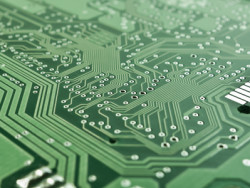Electronics News Byte: Intel Bests Samsung, Auto Industry Issues, NASA/TI Code Challenge, and a New Coronavirus Biosensor
April 27, 2020
on
on
The coronavirus crisis continues to negatively impact the global technology industry. This big question is: How bad will things get? We are not in the prediction game. But we do intend to keep you informed about what industry analysts think. Of course, we will also provide updates on positive news, such as new research and exciting engineering challenges. Here's your weekly electronics news roundup.
News: Intel, Samsung, NASA, and More
- Intel Bests Samsung in Semiconductor Market: According to Gartner, Intel is now the world's top semiconductor vendor. In 2019, Intel hit nearly $67.7 billion in semiconductor revenue, while Samsung, which held the top spot in 2018, fell to second place with $52.1 billion in 2019. Next came SK hynix with 5.3% of the market, followed by Micron Technology (4.8%) and Broadcom (3.7%). As for the big picture, Semiconductor revenue dropped about 12% in 2019.

- Auto Industry Faces Rocky Road Ahead: IHS Markit anticipates a 22% sales decline in global light vehicles sales as a result of the Coronavirus crisis. In particular, the firm reports that the US light vehicle market could drop up to 26.6% from last year. It predicts European sales to drop 24.9%. As for global commercial vehicle products, the firm forecasts a drop 22% in 2020.
- NASA & TI Announce Student Coding Contest: NASA and Texas Instruments announced last week a new "space-themed coding contest" called the NASA & TI Code Contest. Middle and high school students are challenged to solve a problem related to the International Space Station (ISS) for a chance to win prizes. "This coding challenge gives students a break from learning on their screens and encourages some much-needed social interaction as teams work together toward a common goal," Peter Balyta, president of TI Education Technology, said in a statement. Learn More
- Researchers Develop New Coronavirus Sensor: Researchers from Empa, ETH Zurich, and Zurich University have reportedly developed a new biosensor that can detect SARS-CoV-2, which is the new coronavirus. The goal would be to use such a sensor to measure the virus's concentration in a wide variety of locations, from hospitals to crowded locations such as train stations. "Jing Wang and his team have developed an alternative test method in the form of an optical biosensor," Empa is reporting. "The sensor combines two different effects to detect the virus safely and reliably: an optical and a thermal one."
Stay Informed
Visit Elektor’s Electronics News Byte page and subscribe to the tag to stay informed about important industry happenings, trends, and product news. And don’t forget to sign up for Elektor's free weekly E-Zine.Read full article
Hide full article


Discussion (0 comments)